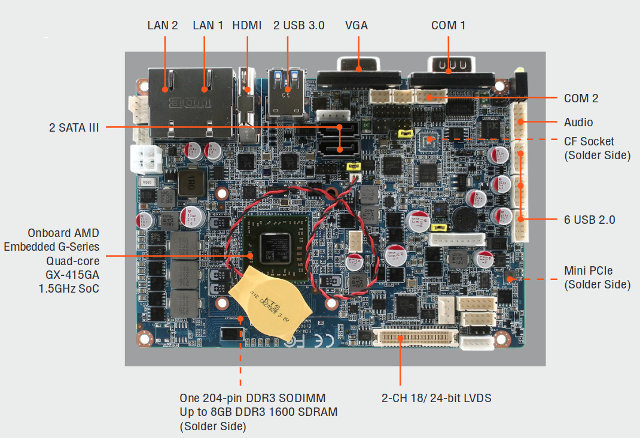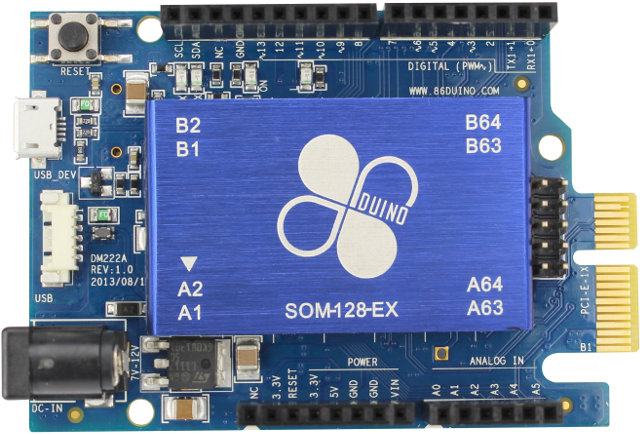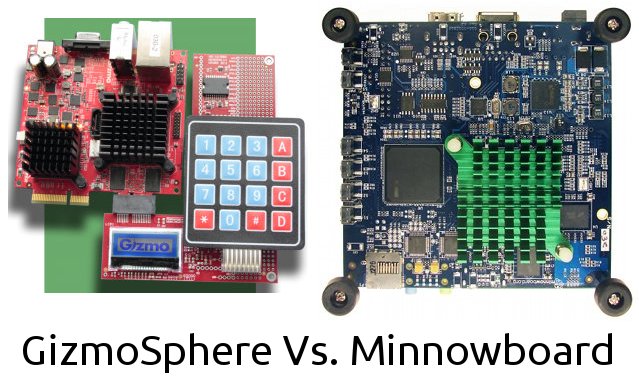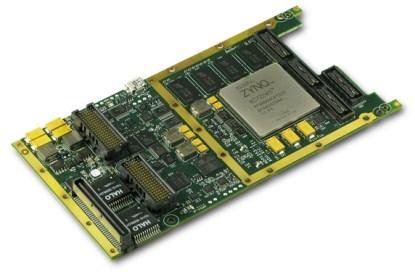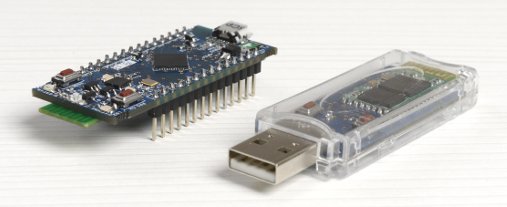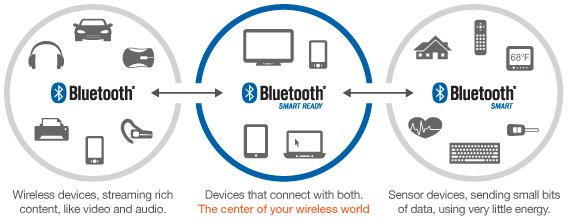Avalue Technology, a Taiwanese company manufacturing industrial and embedded single board computer, has recently announced a 3.5” SBC (single board computer) micro module, labeled ECM-KA, powered by AMD Embedded G-Series SoCs. The board will feature GX-415GA Quad-core SoC by default, with GX-217GA (1.6GHz), and GX-210HA (1.0GHz) dual core SoCs as options. The board targets the embedded market with applications such as industrial controls & automation, gaming (e.g. slot machine, aracade), thin clients, retail/ digital signage, SMB storage server, surveillance, medical, communication, entertainment, and data acquisition. ECM-KA Specifications: SoC – AMD Embedded G-Series Quad-core GX-415GA @ 1.5GHz SoC with on-chip Radeon HD 8400E GPU (Optional GX-217GA 1.6GHz/ GX-210HA 1.0GHz) System Memory – One 204-pin DDR3 SODIMM Socket Supports Up to 8GB DDR3 1600 SDRAM Storage – 2x SATA III and SSD One CompactFlash Type I/II Socket (Support InnoDisk CF-SATA). Expansion – 1x Mini PCIe (mSATA Supported) I/O MIO – 1 x […]
$39 86Duino ZERO is an x86 Arduino Compatible Board that Supports DOS, Windows, and Linux
Intel Gallileo Development Board with a Intel Quark processor, and Arduino software and hardware, now gets some competition with DM&P Electronics’ 86Duino ZERO board powered by the company’s Vortex86EX processor and 128MB RAM, that is said to support DOS, Windows, and Linux. 86Duino ZERO Specifications: Processor – DM&P Vortex86EX 32-bit x86 processor @ 300MHz System Memory – 128MB DDR3 Storage – 8MB SPI flash, and microSD card slot Connectivity – 10/100M Ethernet (at the back of the board, not RJ45) USB – USB host connector, micro USB port for development Arduino Leonardo compatible headers Misc – Reset button, PCIE bus Power Supply – DC-IN 7 to 12V, or via microUSB port. The board is comprised of a daughter board (DM-222) and a System-on-Module (SoM) either called DM-205 and or Vortex86EX SOM-128-EX which the following specs (some of which are not accessible in 86Duino Zero): Processor – Vortex86EX @ 300MHz System […]
GizmoSphere vs Minnowboard – AMD and Intel x86 Embedded Boards Comparison
The Gizmo Explorer Kit is an embedded kit based on a development board powered by AMD G-Series G-T40E dual core APU that’s available since the beginning of the year. The Minnowboard is another new x86 embedded board, but this time based on Intel Atom E640 processor. Both cost $199, so a side-by-side comparison might be useful,and GizmoSphere team released a comparison table for both board, and is offering free shipping for the week with “Sharkweek2013”. Let’s have a look. The company only provided the table in image format, so I’ll reproduce it “as is” below, and see if there may be some correction or addition afterwards, the table has been designed by one of the competitors. The parts in yellow are supposed to highlight advantages of the GizmoShpere against the Minnowboard, but they conveniently “forgot” to highlight advantages of the Minnowboard. [Update 13/08/2013 – Gizmo guys have updated their table […]
Texas Instruments Releases Android App for SensorTag and Publishes Bluetooth Low Energy Training Videos
Texas Instruments Sensortag is a Bluetooth Low Energy (BLE) development kit with 6 sensors (IR temperature, humidity, pressure, accelerometer, gyroscope, magnetometer) mainly destined at mobile application, which I recently tried in Linux. Until now, only it was only officially supported in iOS and Windows, but a few days after the release of Android 4.3 which adds Bluetooth Low Energy support, Texas Instruments quickly worked to release an Android App for their BLE devkit. The annoying part is that the Android app is only available as a Windows executable (SensorTagAndroidApp-0_9_0-windows-installer_2.exe), so you’ll have not choice but to use Windows to uncompress the files. Yet the installation goes as follows: Copy the SensorTag.apk file (SensorTag_0_9_0.apk) to your Android 4.3 device Enable installation of apps from unknown sources (Settings -> Security -> Device Administration -> Unknown Sources) Open file manager and launch, locate the .apk file and install the app by clicking the […]
Alpha Data ADM-XRC-7Z1 XMC Mezzanine Card Powered by Xilinx Zynq SoC
Alpha Data, a company providing solutions for compute intensive applications, has announced the ADM-XRC-7Z1, an XMC board powered by Xilinx Zynq-7045 or Zynq-7100 Cortex A9 + FPGA SoC targeting application such as software-defined radio, radar and sonar processing, image processing and machine vision. If you are like me, and have never heard about XMC mezzanine cards before, here’s what Wikipedia has to say about it: XMC, or Switched Mezzanine Card, is a PCI Mezzazine Card (PMC) with high-speed serial fabric interconnect defined by the VITA 42 standard. XMC specifies a 5th connector (“P15”) that supports PCI Express (VITA 42.3) or other high speed serial formats such as Serial RapidIO (VITA 42.2) and Parallel RapidIO (VITA 42.1). VITA (VMEbus International Trade Association) is an organization developing and promoting open technology standards that you can download for a fee. Here are the specifications of the board: SoC – Xilinx Zynq-7045 or Zynq-7100 dual […]
MINIX MINI HD PC Based on Intel Atom D2550 Sells for $119
MINIX MINI HD PC is a barebone x86 computer without RAM or hard disk that has been announced last year, and it has just come to my attention that the system sells for just $119 on Geekbuying (excluding shipping), so once you add (up to 4GB) DDR3 RAM, and a SATA hard drive, you may have a basic x86 Linux or Windows system for about $200. MINIX MINI HD PC specifications: CPU – Intel dual-core (4 threads) D2550 processor @ 1.86GHz Chipset – Intel NM10 GPU – Intel GMA 3600 Series System Memory – 2x 1.5V DDR3 @ 800/1066MHz SO-DIMM sockets supporting up to 4GB of system memory (GeekBuying reports that “8GB (4GB x 2) memory is supported unofficially, stability will not be guaranteed by Intel”) BIOS – 1 x 16Mbit flash with AMI BIOS. Supports Plug & Play, Advanced Power Management ACPI, STR, CPU temperature, Fan speed, System Voltage […]
$25 Babuino Stick & Board Let You Control Your Devices with Your Smartphone and Vice Versa
Babuino Stick and Babuino Board are tiny low cost Arduino-compatible USB dongle and board featuring Atmel AVR MCU, and Bluetooth 2.0 + EDR connectivity. Both have basically the same hardware, but Babuino Stick is more suited to control a computer or Smart TV via your smartphone, and Babuino Board can be used for robotics and automation projects. The device can also be used to control your smartphone (e.g. to write SMS) from your PC or Mac. Here are the specifications of these “Babuini”: MCU – Atmel ATXMega128A1 @ 32 MHz with 128KB flash program memory, 8KB boot code section, and 8KB SRAM. Master/Slave selectable Bluetooth 2.0 + EDR module Infrared transmitter and receiver USB – micro USB (board) and USB port (stick) User and reset push-buttons Headers (Board only) – ICSP pins, ADC & DAC, PWM, I2C & SMBus, SPI and UART LEDs – Bluetooth and User LED for both, […]
Bluetooth Versions Walkthrough, and Bluetooth 4.0 Low Energy Development Resources
I’ve seen more and more Bluetooth 4.0 LE devices in the last few months including RFDuino, Wimoto Motes, TI SensorTag, and Scadanu Scout, so I thought it would be good to write a bit about Bluetooth. First, I’ll write about the different version of Bluetooth, since I was still confused with the practical implications between the versions, and then I’ll show some development kits and software resources to play around and/or develop Bluetooth 4.0 LE applications both on devices and hosts. Bluetooth Versions Bluetooth v1.0 and v1.0B The Bluetooth 1.0 Specification was released in 1999, and according to an entry in Wikipedia, 1.0 and 1.0B devices had many issues, mainly interoperability issues. You won’t find any Bluetooth 1.0 device today. Bluetooth v1.1 Bluetooth v1.1 was ratified as IEEE Standard 802.15.1-2002 in 2002. It fixed many issues found in the previous specifications, added the option to use non-encrypted channels, as well […]


